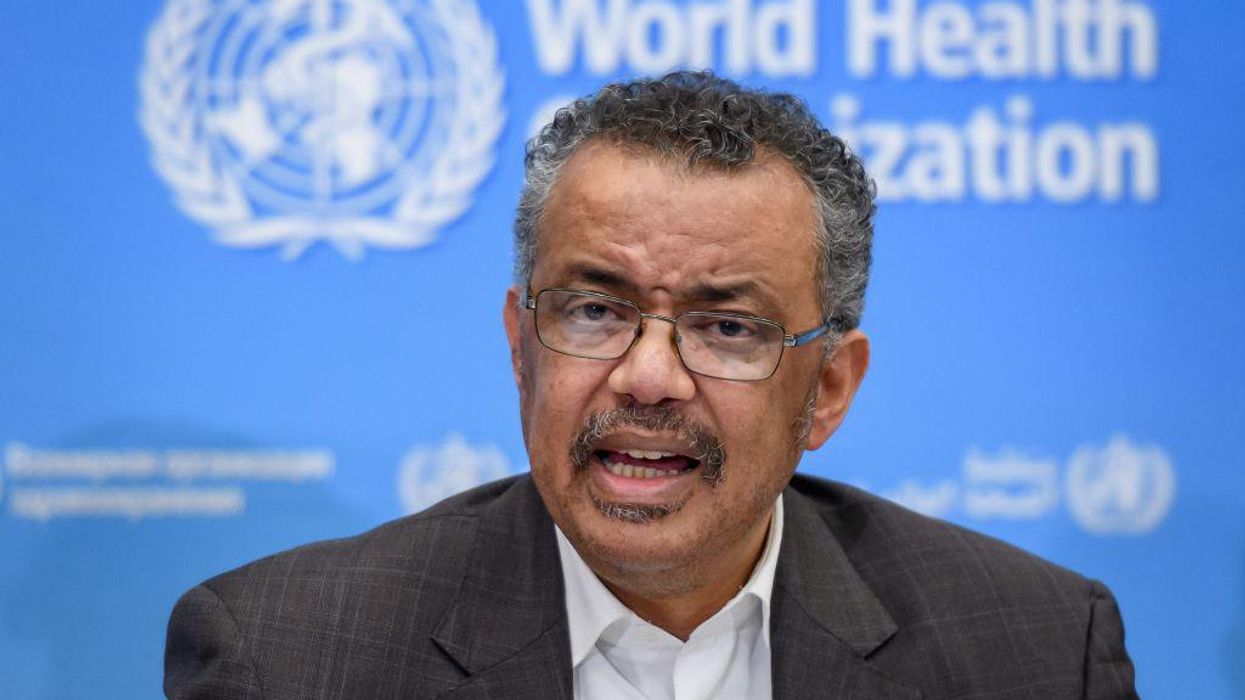
FABRICE COFFRINI/AFP via Getty Images

The World Health Organization announced on Wednesday the proposed members of a new team to study the origins of the COVID-19 virus.
Of the more than 700 applicants who were considered, 26 scientists were selected to work on the WHO Scientific Advisory Group for the Origins of Novel Pathogens with expertise in fields including epidemiology, animal health, ecology, clinical medicine, virology, genomics, molecular epidemiology, molecular biology, biology, food safety, biosafety, biosecurity, and public health.
The WHO touted in its press statement that "the composition of the SAGO reflects geographic and gender diversity."
"The emergence of new viruses with the potential to spark epidemics and pandemics is a fact of nature, and while SARS-CoV-2 is the latest such virus, it will not be the last," WHO Director-General Tedros Adhanom Ghebreyesus said.
"Understanding where new pathogens come from is essential for preventing future outbreaks with epidemic and pandemic potential, and requires a broad range of expertise. We are very pleased with the calibre of experts selected for SAGO from around the world, and look forward to working with them to make the world safer," he added.
The SAGO will be the second team put together by the WHO to investigate the origins of COVID-19 after the first team published a widely criticized report earlier this year that determined that natural spillover was the most likely origin of the virus. The report also said an alternative hypothesis that COVID-19 was somehow leaked from a Chinese lab was"very unlikely."
Critics said first team's effort was hampered by interference from the Chinese government and also poisoned by conflicts of interest, notably the inclusion of EcoHealth Alliance president Peter Daszak on the team. Daszak's organization had for years funded bat coronavirus research at the Wuhan Institute of Virology — the lab at the center of the lab-leak theory. He and other prominent public health scientists had also worked behind the scenes to discredit the lab-leak theory, even though scientific evidence suggests both hypotheses remain viable, as a U.S. intelligence report commissioned by President Joe Biden earlier this year found.
The widespread criticism and calls for a new investigation prompted the WHO to establish this new team, which will be a more permanent body meant to avoid politicization in future pandemics, the New York Times reported.
"Especially in light of the politicization of this particular aspect, we want to take this back to the science, take this back to our mandate as an organization to bring together the world's best minds to outline what needs to be done," Maria Van Kerkhove, the WHO's Covid-19 technical lead, said in an interview with the Times.
However, at least six proposed members of the SAGO were members of the WHO's first criticized investigative team: Marion Koopmans, John Watson, Thea Fischer, Hung Nguyen, Vladimir Dedkov, and Farag El Moubasher.
Additionally, Koopmans and another proposed member, Christian Drosten, were participants on a secretive teleconference held in February 2020 with White House chief medical adviser Dr. Anthony Fauci, Daszak, and others involved in efforts to discredit the lab-leak theory. Before this call, some of the world's top virologists who had participated had raised concerns that the emerging SARS-CoV-2 virus had features that "(potentially) look engineered."
But after the call, several of those scientists reversed their opinions and publicly condemned the COVID-19 lab-leak theory as a conspiracy theory.
Drosten, who is Germany's leading COVID-19 expert, is noteworthy for sitting on the editorial board of Emerging Microbes and Infections, a scientific journal that on Feb. 26, 2020, published an influential article claiming there was "No credible evidence supporting claims of the laboratory engineering of SARS-CoV-2."
Between the time the article was drafted and the time it was published, the article's authors privately expressed doubts to each other about its conclusions, even as EMI expedited publication of the commentary and waived customary publication fees.
Those concerns were never disclosed before the article was published and only came to light because of records requests from U.S. Right to Know.
The inclusion of Koopmans and Drosten on the new team may undermine the WHO's effort to de-politicize the investigation of COVID-19's origins.
Over the next two weeks, the WHO will consult the public for feedback on the proposed SAGO members before announcing the final membership of the team.
Public comments must be submitted to SAGO@who.int with subject, "Public comments on SAGO members" by October 27, 2021.